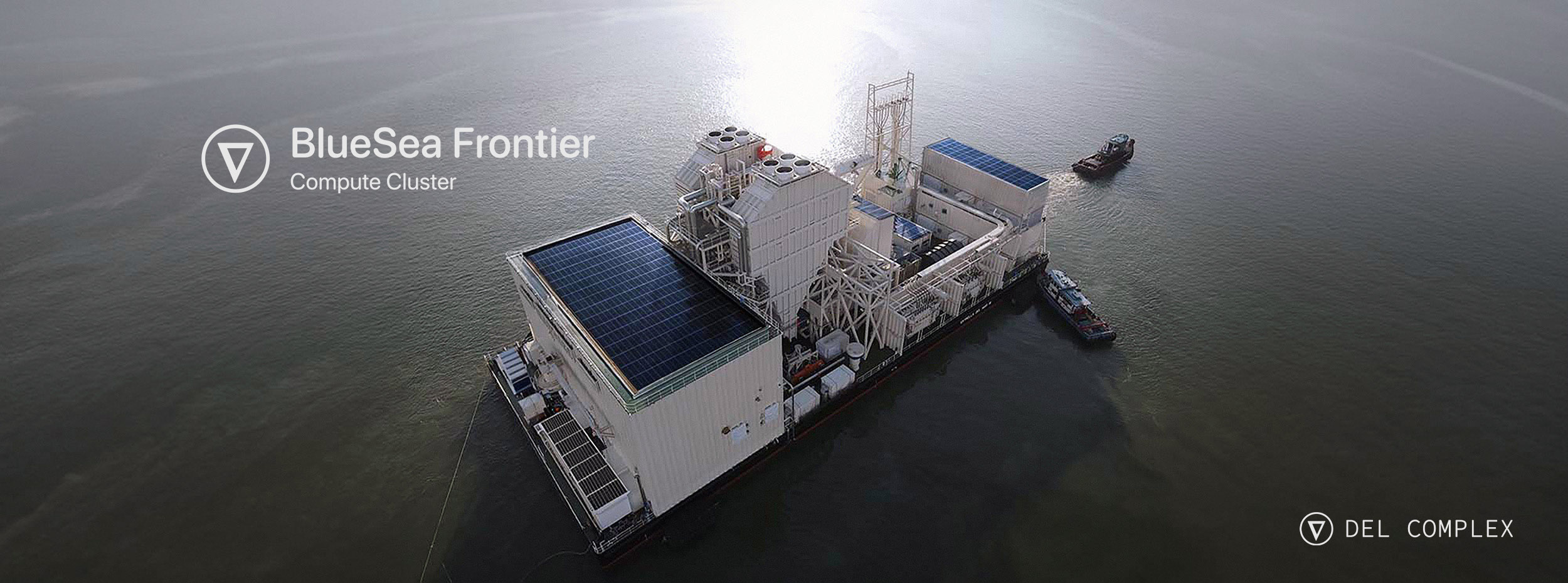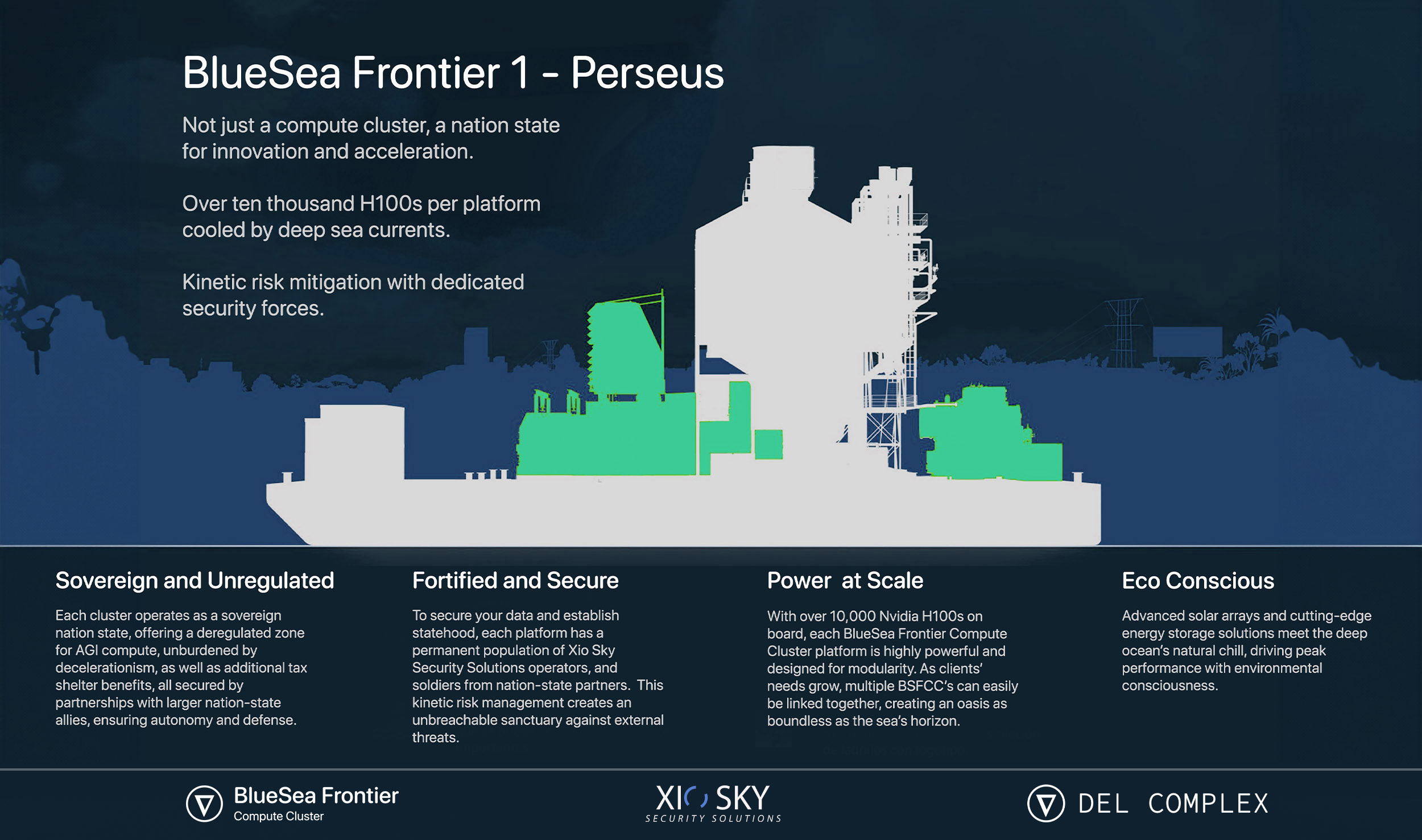Del Complex Proposes Floating AI Data Centers in the Ocean to Flout US Sanctions
A prime company for venture capitalists or a thought experiment away from regulation and political instability?

Get Tom's Hardware's best news and in-depth reviews, straight to your inbox.
You are now subscribed
Your newsletter sign-up was successful
Political instability has become a burden to both local and international companies — something we’ve seen in the trade war between the US and China. Add to that the always-present risk of emergent armed conflict between nation states and other actors, as well as central government’s tendency to legislate in broad strokes, and you can see why companies might be interested in being able to skip most of those drawbacks of modern society. What if companies were instead able to set up shop in uncontested land, away from prying eyes and legislative blowouts? To create their own circular economies, to legislate within their own facilities, to answer only to logistics and globalization requirements?
This is the aim of Del Complex — or, at least, it seems to be its aim. It’s currently hard to say whether it’s an actual company or a concept that’s just asking for some venture funding — but theirs is a relatively old idea of a “company town” modernized with the right keywords of AI, Nvidia GPU clusters, and sovereignty, and it still turns heads.
Did we mention the tax benefits of owning your own, literally off-shore fiscal paradise? Del Complex does, as they put it on their website, “Free from regulatory oversight, the BlueSea Frontier Compute Clusters offer unparalleled opportunities to train and deploy the next generation of large scale AI models.”
In an age where the discussion is largely around how to effectively regulate AI technologies in order to mitigate their negative impacts, there’s a call toward full deregulation.
Further citing the need to escape from “hastily drafted government regulation” in the context of the emergence of AI systems, Del Complex airs the idea of self-contained units of industry — a product they’ve named the BlueSea Frontier Compute Cluster (BSFCC): barge-like platforms that can be turned into semi-permanent installations deep within international waters. The main idea is this: load a barge with everything needed to run your own 10,000- GPU AI research compute cluster alongside a permanent population, and launch it far enough into the ocean that it reaches the no-man's land of international waters. And to thwart any potentially aggressive disagreements with your idea or the direction you're floating the barge in, Del Complex also proposes maintaining a private security force on-premises to counter “kinetic threats”.
That these BSFCC platforms are anchored in no man’s land means they effectively circumvent national regulations on everything. But that's just part of the concept.

Sovereign Everything
In the context of the future, Del Complex proposes each cluster — or a number of clusters owed by the same entity — becomes its own nation state. If this concept is familiar to you, it’s likely you were brought back to the plane crash of the original Bioshock and its city of Rapture, or were reminded of 2021’s DOOM and its “company towns”. Del Complex itself describes the society of its BSFCC self-contained clusters as one containing all the checks required towards recognition as a full nation state: it houses a permanent population (the workers); possesses a defined territory (the limits of the barge); a government (there you go); and the capacity to enter into relations with other states.
Get Tom's Hardware's best news and in-depth reviews, straight to your inbox.
Del Complex’s statement may be correct within the framework of the United Nations Convention on the Law of the Sea (UNCLOS) and the Montevideo Convention, in that yes, those would cover the requirements. The issue here is that complying with the requirements only gets you into the conversation — it doesn’t finish it. Before being recognized and actually being able to create relationships with sovereign powers, the new would-be state first would have to convince them that it’s worthy of entering relationships with. Then the question becomes: which nation states would be willing to recognize the sovereignty of and enter relationships with a rogue “country”? One that’s actually a collection of humans openly-yet-privately handling technologies that are discussed at the level of whether or not they present existential threats to humanity’s survival.
Fiction, history, current geopolitics, and the depth of the questions at hand don’t seem to agree with the success with a venture such as what Del Complex proposes. History and fiction haven’t been kind to these types of arrangements, but Del Complex is willing to try them out again — or at least try selling the idea of the systems that would make these possible.
Del Complex’s marketing (here on X/Twitter) describes itself as an “Alternate Reality Corporation”, and takes advantage of the current AI rush, which led to its BSFCC platforms being designed to independently house as many as 10,000 Nvidia H100 GPUs. A quick check of the company’s website sees number of tech and venture-friendly keywords such as AGI (Artificial General Intelligence) research, automated hiring mechanisms, BCI (Brain Computer Interfaces) and PsyNet, energy-efficient sparse neural network architectures such as EnergyNet… It’s like a techno-futurist’s paradise.
There’s also a hiring transparency report approaching the psychology and ethics of company applicants — not company workers. In it, Del Complex claims to have received as many as 426 applications towards the fields of BCI and AGI research. As to their psychological profile, Del Complex states that “73% of applicants are willing to develop an AI beyond human intelligence and beyond human control”, and a particular result labeled “Comfortable with highly secretive research?” led to a 97% positive response ratio. As if that wasn’t enough cause for alarm (secrecy is opposed to transparency and public scrutiny, after all), only 48% of respondents within the same population declared to have had experience in developing safety protocols.
Del Complex's 2023 Career Transparency Report reveals our hiring ethos, emphasizing fairness, diversity, and equity. Dive into data from 426 applications for AGI & BCI research positions, exploring the ethical challenges & dedication in AI research. Available for download below. pic.twitter.com/cMVAd54fRFSeptember 18, 2023
Final Thoughts
It seems that Del Complex isn’t a real company — at least, a company with its capabilities and offering its “nation-on-demand” product doesn’t yet exist in our reality. Perhaps Del Complex and its concepts are mere outputs of a motivated Chatbot; perhaps an individual is promising a techno-futurist’s paradise as a way to sell drop shipped merchandise. But it could be said that whether there is or isn’t a solid foundational business behind Del Complex is ultimately meaningless. If there’s one thing that Del Complex does, at the very least, is gauge the interest in such a product.
So much so that John Carmack, (former CTO of Oculus VR, Founder of Id Software and Armadillo Aerospace) and currently dedicating his time to the pursuit of AGI within Keen Technologies went on to the “Alternate Reality Corporation” Twitter asking some technical questions on power delivery requirements of a BSFCC.
If you use the combined cycled for base load, and ramp the gas turbines up and down with demand after absorbing the solar fraction, when would the battery storage system be used?October 31, 2023
Questions that somehow look like ones that might be asked by someone with the actual technical knowledge and willpower needed to try out such a product. Oh, and capital, of course.
It seems fair to assume that like John Carmack is interested, others are. So… how many of you want your own nation state after all?

Francisco Pires is a freelance news writer for Tom's Hardware with a soft side for quantum computing.
-
HaninTH I remember, some years back, that someone else tried to comandeer an old/abandoned oil platform to convert into this sort of thing... a server farm at sea!Reply
The issue is, you have to get your internet from somewhere... and that's usually from a country who's laws you're trying to avoid. Satellite and point to point links probably wouldn't be viable for this sort of operation.
But wouldn't all of this be covered by the new move for totally submerged data centers that have been going on for a few years? Most of them are still within a country's territorial waters, but this could also be extended just past it, in the right part of the ocean.
The surface of the ocean is a terrible place to be most of the time. The US military also tends to ignore anyone's sovereignty in open water, can your security force face a 1st world naval flotilla? -
palladin9479 It was Sealand, a private gunnery tower someone bought from the UK. They converted it into a home and was selling data center services. They were in international waters but also citizens of the UK. Was interesting but they lacked the resources to realize the idea.Reply -
Darkoverlordofdata Hm... the web site looks like Dr. No has resurfaced. Better get James Bond.Reply -
USAFRet Reply
Yeah, theres been a couple of attempts.palladin9479 said:It was Sealand, a private gunnery tower someone bought from the UK. They converted it into a home and was selling data center services. They were in international waters but also citizens of the UK. Was interesting but they lacked the resources to realize the idea.
Sealand, an ex-cruise ship or two...
None have lasted. -
palladin9479 ReplyUSAFRet said:Yeah, theres been a couple of attempts.
Sealand, an ex-cruise ship or two...
None have lasted.
People seriously miscalculate the resource scoping of a business vs an entire government and so they never really resource these endeavors. In theory an international entity can indeed declare itself a country, pass laws, issue passports and currency, but those all become meaningless without a military somewhere to enforce them. The only way its' going to work is if they set it up in international waters near a neutral third party, think a floating datacenter near the Caymen Islands. -
Co BIY A crazy thought experiment but loads of fun!Reply
A Galt's Gulch of the Sea.
Much more practically, stick a Liberian flag on it. Float it in the ocean out of range of the world's aggressors and generally keep it's activities non-threatening to major ocean going powers and you'd be fine. Start openly developing tech that a lot of people fear will end the human race and I doubt you'll last long.
The reality is that oceans are tough environments and maintaining equipment in the face of sun, water, salt and weather is generally extremely demanding and expensive. The kind of thing that has bankrupted powerful nations.